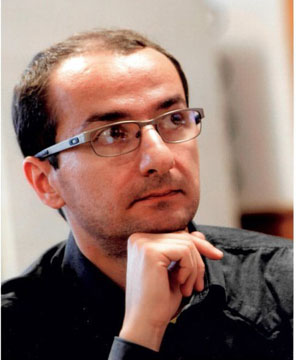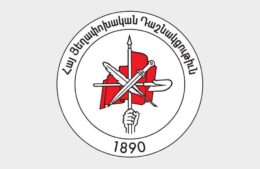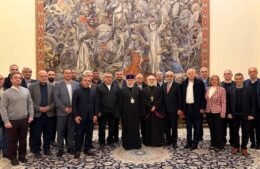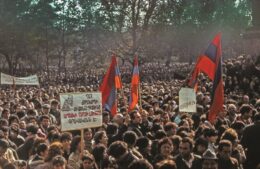New Rutgers Course on Concentration Camps Examines Armenian Genocide
- (0)
Armenian Weekly editor and Ph.D. candidate Khatchig Mouradian will instruct the course at Rutgers University
NEWARK, N.J.—A new course examining concentration camps used during five different wars is being offered at Rutgers University this spring. Armenian Weekly editor and Ph.D. candidate Khatchig Mouradian instructs the course, “Sociology and History of Concentration Camps” at the university’s Newark, New Jersey campus.
The course traces the evolution of the concentration camp from a counter-insurgency strategy in wartime to a weapon of mass murder. Cases being studied include the Spanish-Cuban war, the Second Anglo-Boer War, the Philippines-American War, the Armenian Genocide, and the Holocaust.
“The course provides an overview of the history of the concentration camp as a means to control, suppress, and destroy populations,” said Mouradian. “We look at the historical context, the decision-making process, and the interaction between central and local authorities, yet we focus on the agency of the victims and survival in the camps, with particular attention to power dynamics, race, gender, and class.”
The course and a series of lectures and events are being sponsored by the Armenian Genocide Program of the university’s Center for the Study of Genocide and Human Rights (CGHR) in collaboration with The Genocide Education Project – Higher Education Division (GenEd-HigherEd).
CGHR promotes research and scholarship on issues including genocide, conflict resolution, sustainability, justice, global health, and human rights. In the few years since its inception, CGHR has already sponsored numerous courses, lectures, conferences and cultural activities directed at its mission “to enhance our understanding of and find solutions to the most pressing 21st century challenges related to peace and conflict.”
CGHR has also hosted several programs through its Armenian Genocide Program. Mouradian has been the Program Coordinator since 2011 and also teaches a course in conflict resolution at Worcester State University as adjunct professor. His PhD dissertation at the Strassler Center for Holocaust and Genocide Studies at Clark University, examines the second phase of the Armenian Genocide.
The Genocide Education Project is a nonprofit organization that assists educators in teaching about human rights and genocide, particularly the Armenian Genocide, by developing and distributing instructional materials, providing access to teaching resources and organizing educational workshops. It seeks to broaden the general understanding of the Armenian Genocide, in the context of the history of World War I and as a predecessor of the pattern of genocides that followed. GenEd-HigherEd is focused on facilitating courses and other programming at colleges and universities.
James Sahagian, director of GenEd-HigherEd worked closely with the Rutgers CGHR to establish this course. “We are pleased to offer students a course that introduces key aspects of the Armenian Genocide in relation to other genocides and historical conflicts. We look forward to increasing our collaboration with CGHR in the future.”
Further information on this course and the Armenian Genocide Program at Rutgers can be obtained by calling (201) 739-0901 or by emailing highered@GenocideEducation.org.
The Genocide Education Project is a nonpartisan, nonprofit, tax-exempt 501(c)(3) educational organization that assists educators in teaching about human rights and genocide, particularly the Armenian Genocide, by developing and distributing instructional materials, providing access to teaching resources and organizing educational workshops. For more information about The Genocide Education Project, go to www.GenocideEducation.org.



















